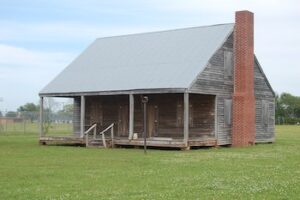
Epps House (that Bass helped build)
*Samuel Bass's birth is celebrated on October 30, 1807. He was a white-Canadian laborer and abolitionist.
Bass was born and raised in Augusta Township, Upper Canada (now Ontario). His parents were John and Hannah Lakins Bass, who had twelve children. His grandparents, Adonijah and Lydia Draper Bass were United Empire Loyalists who lived in Walloomsac, New York, during the American Revolutionary War. Bass married Catharine Lydia Lane, and they built a house and had four daughters. He did not have a great relationship with his wife and left Canada around 1840 for America, where he had relatives.
In the 1850s, he came to Marksville, Louisiana, in Avoyelles Parish. John Waddill hired him as a laborer. They talked about his life in Canada, which Waddill recorded in a diary. Bass freely expressed his concerns about slavery, which would not have been welcome in the Deep South. Bass stayed in the area because he was a respectful listener to other viewpoints and a conversationalist. Bass was hired in 1852 to build a new house called the Edwin Epps House for Edwin Epps's family.
Bass and Solomon Northup, who Epps enslaved, worked together to construct a cottage. By this time, Northup had been a slave for eleven years after being kidnapped. Bass expressed his opposition to slavery with Epps. Feeling comfortable with Bass, Northup shared his story and asked Bass to mail letters to his friends in New York. Bass agreed to help at great risk because of the Fugitive Slave Act of 1850.
They wrote to three men. Northup provided their names in Saratoga Springs, New York. They were Judge Marvin, Cephus Parker, and William Perry, who could vouch for his free status. They met secretly late at night and agreed that Bass should write the letters in his room at Marksville not to be discovered. They figured it might take six weeks for the letters to respond. For safety, they avoided one another after the letters were sent. With no answer for months, Bass decided to travel to Saratoga and deliver the message personally if needed. The letters to Parker and Perry notified Northup's wife of her husband's whereabouts. Henry Bliss Northup, a lawyer and a relative of Northup's father's former slaveholder, was notified, too.
With six affidavits and a petition, Henry Northup obtained a letter from Governor Washington Hunt of New York declaring that Northup was a free man. Hunt appointed Henry an agent of rescue. Henry carried the letter with him as he traveled to Louisiana to meet with Waddill, who then wrote in an affidavit that Northup was "violently and fraudulently kidnapped." Waddill filed a lawsuit against Edwin Epps, after which Judge Ralph Cushman provided the paperwork for Epps to release Northup.
Henry arrived at the Epps' plantation on January 3, 1853, with the sheriff of Avoyelles Parish to free Northup. The New York Times published an article about Northup's years of slavery and emancipation, and Bass was not mentioned in the article to protect him. Samuel Bass lived in Marksville, where he had a relationship with a free woman of color, Augustine Tournier; they had a daughter. Bass prepared a will with Waddill the night before he died of pneumonia on August 30, 1853, at the home of Justine Tournier.